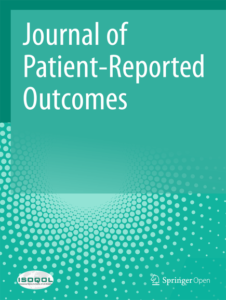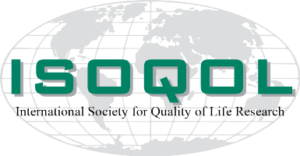
JPRO is intended to complement and extend ISOQOL’s existing journal, Quality of Life Research. The aims and scope of the Journal of Patient-Reported Outcomes focus on high quality research in five major areas: (1) Patient Reported Outcomes (PROs) in clinical trials; (2) applications of PROs in clinical practice; (3) patient, family, community and public engagement in PRO research; (4) qualitative studies on the development and application of PROs; and (5) social and behavioral determinants of health and PRO measures. These focus areas are only some examples of the types of papers that will be considered for publication in JPRO.
What are patient reported outcome measurements and what does the journal provide for the field?
Patient reported outcomes represent those reports that are made directly by individual patients without interpretation or modification by anyone else. Patient reported outcomes may involve assessments of symptom frequency or severity, physical, psychological and social functioning, health-related quality of life, life or treatment satisfaction or self-reported treatment adherence, among other concepts.
JPRO focuses on several important areas of patient reported outcomes research, including: complete reporting of health-related quality of life outcomes from clinical trials and other studies; qualitative research to understand the disease experience and to inform instrument development; patient and community engagement in patient reported outcome studies and in health policy applications; social and behavioral determinants of health-related quality of life; and methods and applications of patient reported outcomes in clinical practice settings.
How has the journal’s field advanced in the last few years?
Over the past 10-20 years, there have been major improvements in the development of new patient reported outcomes measures and the development of item banks for health-related domains and the application of computerized adaptive testing for administering patient reported outcome measures. The field has seen a dramatic increase in patient and community engagement in health outcomes and clinical effectiveness research, improvements in qualitative research methods, and increased applications of patient reported outcomes in clinical practice settings, for quality improvement activities, and for electronic health records.
What do you think will be an important focus of research in the next several years?
We expect to see increased applications of patient reported and other health outcomes in clinical practice and in evaluations of the quality of medical service delivery. There will likely be improvements in and wide dissemination of different methods for collecting health outcomes and clinical data. Psychometric and other methods for developing new patient reported outcomes will continue, and mixed qualitative-quantitative methods will increasingly be used to develop and evaluate new PRO measures. We anticipate that patient reported outcome measures will be incorporated into pragmatic clinical trials comparing medical treatments in community settings, and that the full reporting of the findings of these studies will be important for improving the efficiency of health systems. We also expect the increased use of PRO measures in patient and community engagement.
What advice would you give a researcher before submitting to the journal?
The editors recommend focusing on clear research questions and methodically sound approaches to addressing these research questions on patient reported outcomes. Those studies and manuscripts, either focused on developing new methods are measuring or applying patient reported outcome measures across varied settings, and for examining ways to engage patients, families and communities in formulating relevant research questions and answering research questions that matter to both patients, their clinicians, and society will be of greatest interest to the field of health related quality of life studies.
We are interested in publishing methodologically sound high-impact manuscripts that focus on one or more of the identified journal focus areas (i.e., clinical trial reports; qualitative research; patient and community engagement; determinants of health; applications in clinical practice). We think that there a numerous good research studies underway in these health outcomes research areas, and look forward to including the best in the Journal of Patient Reported Outcomes.
The International Society for Quality of Life Research (ISOQOL) and Editors are proud to announce the Journal of Patient-Reported Outcomes is now open for submissions.
Please visit the Society website for further information – https://www.isoqol.org/

Comments